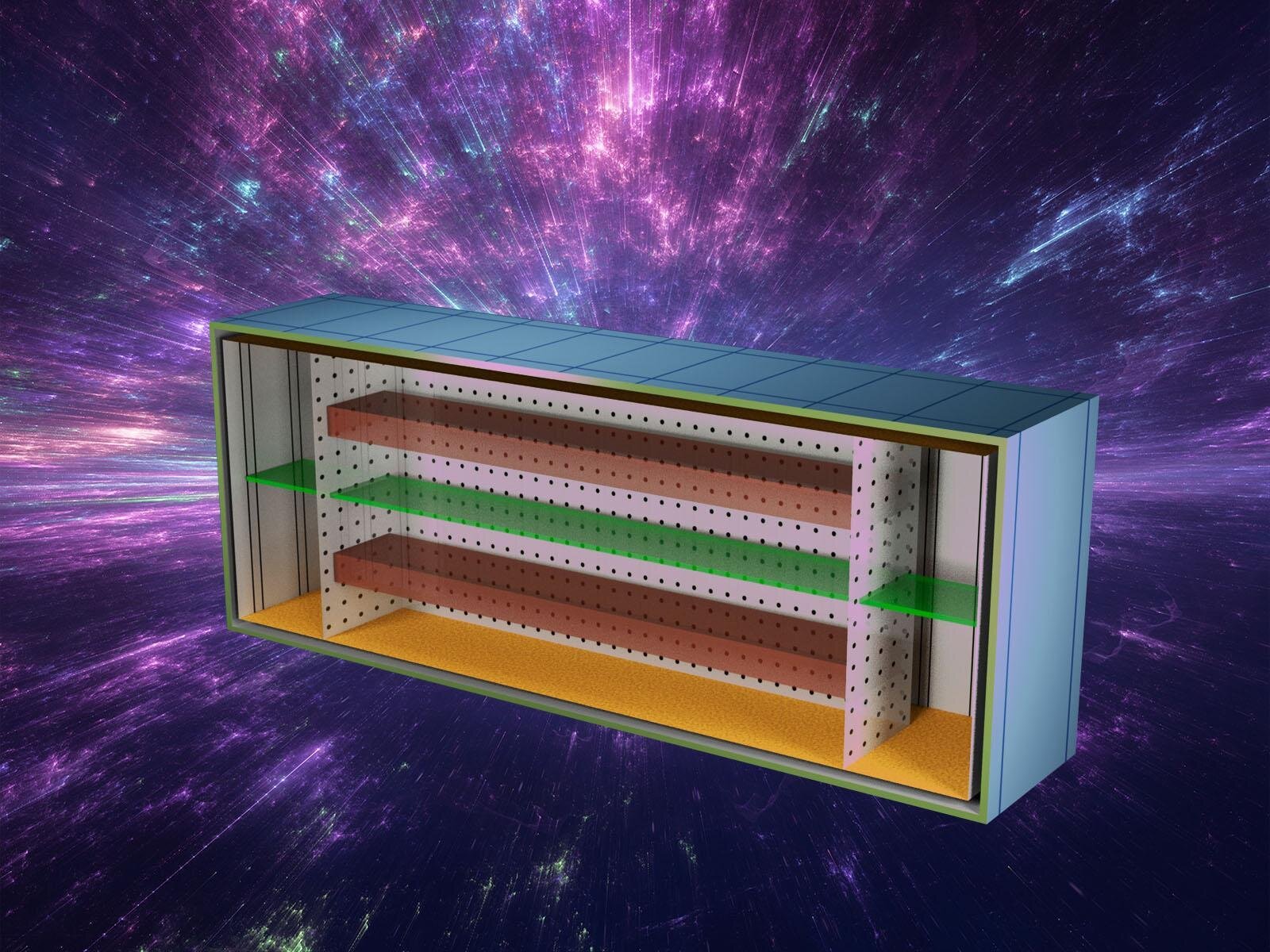Sean M. Carroll, physicist_ ‘Understanding simply 5% of the universe already looks like lots’

Sean M. Carroll’s newest guide “comprises advanced formulation!”
It doesn’t seem to be one of the best promoting level for a piece that aspires to overcome the plenty. However the theoretical physicist – who has additionally mastered the artwork of the scientific best-seller – perfected it in the US with The Largest Concepts within the Universe: House, Time and Motion (2022). In it, he critiques the historical past of elementary physics in 9 ideas: conservation, change, dynamics, house, time, space-time, geometry, gravity and black holes. He wrote the guide after being inspired by the success of the talks he posted on YouTube in the course of the pandemic. It’s the primary in a trilogy that – he guarantees – will “enhance in complexity,” till they attain the summary debates of the current and the way forward for the self-discipline, that are the main focus of his fashionable podcast, Mindscape.
“Equations are like poems,” he says, in an interview with EL PAIS in Could at his workplace in Johns Hopkins College, in Baltimore. Throughout the tree-lined road from campus is the institute from which the James Webb telescope is managed.
The Philadelphia-born Carroll, 56, is comfy transferring between science and tradition: this previous semester, he taught a course referred to as Pure Philosophy, which he designed. “Like a great poem, an equation forces you to suppose, to interpret,” he muses. “It’s brief, intense… nothing is left over. And it’s unimaginable to paraphrase it, in the identical approach that it’s unimaginable to inform the plot of The Waste Land (by T. S. Eliot). The popularization of physics makes use of analogies, metaphors and anecdotes. I wished to go additional, present readers what’s backstage. Though it’s not a textbook: it’s not essential to know the right way to remedy [the formulas] – it’s sufficient to grasp them.”
Query. What’s pure philosophy?
Reply. It’s a sort of information that reminds us that philosophy and science was the identical. What we now name science was a subset of philosophy. Round 1800, they separated. As we speak, information is far broader than in Aristotle’s time – it’s unimaginable to be an professional in every little thing.
Q. You’re a number one theoretical physicist who additionally theorizes – like Aristotle – concerning the dramatic arts. Is it now not attainable to be a polymath?
A. There’s extraordinary entry to information in many alternative areas, however I discover it very troublesome to be a cutting-edge researcher in multiple subject. Edward Witten involves thoughts: [he’s] considered one of right now’s main theoretical physicists, who’s additionally one of the best in mathematical physics. However [this doesn’t happen much] in very completely different disciplines, comparable to biology or historical past. As we speak, every little thing is extra compartmentalized, partly due to how universities are organized. I advocate for extra [fusion]. There’s sensible information, wherein you don’t want philosophy… for instance, if you wish to find the farthest galaxy. [But] should you’re curious about why the Huge Bang occurred, [philosophy] will likely be helpful to you. There’s a joke that, when philosophy begins to reply questions, it turns into one thing else: psychology, physics, biology…
Newton – who we contemplate to have basically been a mathematician, or a physicist – would have referred to as himself a thinker. These days, nobody would name me that, although a few of my questions are fairly philosophical in nature: What’s quantum mechanics? The place does the universe come from?
Q. Why is there one thing as an alternative of nothing?
A. The brief reply to that query is that – I feel – it’s an unanswered query. Certainly, it belongs extra to the sector of philosophy than to physics. Whenever you ask why there’s one thing fairly than nothing, you’re assuming that there’s a purpose, a elementary truth, [as to] why the universe exists. Nicely, I consider that there’s no such elementary truth. I consider that the universe, merely, exists.
Q. Within the guide, you clarify that, in an increasing universe, power isn’t conserved.
A. It is dependent upon what you perceive by power. In physics – should you lived within the time of Isaac Newton – there have been concepts that made excellent sense. However then got here normal relativity and quantum mechanics, [where the concept] of power adjustments in that means. If you happen to take the power of this desk, of this chair, of the constructing and of every planet and add up all of the photons within the universe – and take time under consideration – then, the reply is that power isn’t conserved. As a result of [time and space are] altering. It’s like should you put a cup of espresso on high of this desk: power is conserved, however should you throw it into the ocean, it’s not. It’s as if the waves have been the space-time that pushes the cup.
Q. Do you share the concept that philosophy is considerably stagnant?
A. No. It appears to me that scientists [treat] philosophy unfairly, by asking for tangible outcomes. We’re so obsessive about getting the best solutions. Philosophers are very affected person and insightful. They should make it possible for all their phrases imply one thing. They usually positively assist us illuminate the foundations on which science is constructed.Q. The guide begins with the formulation of a want: to stay in a world the place, after work, folks focus on darkish matter within the pub. What must change to ensure that that to occur?
A. So much. [In my books], I say that folks have to be given extra particulars. Physics is generally lowered to a set of information [that need to be] memorized. However the strategy of science is totally completely different: it’s about formulating hypotheses – which are sometimes flawed – and amassing information, which could be very hardly ever definitive. Science is the simultaneous sum of the willingness to vary your beliefs primarily based on new proof and the knowledge that a few of these beliefs are very troublesome to vary. Individuals are often keen to consider considered one of two concepts… nearly by no means each.
Sean M. Carroll, throughout his interview with EL PAÍS, in Baltimore, on Could 24, 2023. LENIN NOLLY (Lenin Nolly/El Pais)
Q. Your guide will also be learn as a treatise on the historical past of physics, with all its turning factors. The place is self-discipline now?
A. So far as elementary physics is worried, we’re not at a turning level. Some folks complain that we don’t have revolutionary concepts like these of a century in the past. This appears unfair to me: that was a really, very particular time. We found relativity and quantum mechanics, particle physics and the Huge Bang principle. You’ll be able to’t anticipate that to occur each 50 years! However, on the similar time, there are elements of high-level physics – advanced techniques, thermodynamics, statistical mechanics, fluctuations, biophysics – the place there are nonetheless fruits inside attain, as a result of we’re nonetheless at a really fundamental degree. That’s what my third guide will likely be about.
Q. How is it attainable that, a century later, we nonetheless can’t clarify greater than 5% of the universe?
A. It’s true that the particles that we’ve detected in experiments represent solely 5%. There’s 25% that’s [made up of] darkish matter. And 70% is darkish power. We haven’t detected them within the laboratory, however we all know that they’re there and we all know a few of their properties. We really know fairly a bit about [these particles], though we’re not fairly achieved determining what they’re. It appears to me that understanding 5% of the universe is already lots.
Q. Everybody remembers what they have been doing on 9/11, or when Michael Jackson died. In your occupation, the query should be: What have been you doing when the Higgs boson was found in 2012?
A. [Laughs]. I used to be on the CERN (the European Group for Nuclear Analysis) press convention. I even wrote a guide [about this]. It was very thrilling. However, to be truthful – and with out eager to detract from it – we anticipated to search out one thing else, a variety of different issues [instead of the Higgs particle]. We have been awaiting a revolution, the daybreak of a brand new golden age. It didn’t occur.
Q. Did you benefit from the Oscar-winning The whole lot In every single place All at As soon as?
A. I liked it. The concept of the multiverse arises in physics from string principle, [specifically] the ten dimensions and the way they will work together with one another. They might be completely different universes, with completely different bodily legal guidelines.
Q. The large query from humanism is: the place does that principle depart id? The principle character within the movie not solely discovers that the multiverse exists, but in addition that she lives within the worst of its variations…
A. The ethical of the movie is that it’s not so in any case. However sure, the considered having twins on the market making barely completely different selections than you definitely raises some deep questions. It’s handy to distinguish between multiverses. There’s the cosmological, which means that there are areas of the universe very distant in space-time, wherein the circumstances are very completely different. [Then there’s the] idea derived from string principle: that the world isn’t fabricated from particles, however of loops of strings, or what we name “cosmic inflation” (the fast enlargement of the universe). Each [ideas] belong to speculative physics and are removed from confirmed, however they’re very talked-about. Then, there are the numerous worlds of quantum mechanics – [the discipline] which is definitely more likely to be true. It’s a fairly deep subject – we’re nonetheless scuffling with the right way to cope with it as physicists and as philosophers.
Q. Was the current announcement – that the US is near attaining nuclear fusion – exaggerated?
A. I’m all the time pissed off by these press releases, as a result of there’s clearly a vested curiosity in speaking a giant discovery. In actuality, [the researchers involved] haven’t achieved a response that generates extra power than it takes to make the response. What they do is fast bookkeeping: they don’t embrace a few of the power they make investments. [Nuclear] fusion could possibly be a breakthrough… but it surely doesn’t appear to me that will probably be a matter of a few years, however fairly of a long time.
Q. Are you involved concerning the development of synthetic intelligence?
A. I’m not alarmist about it. I don’t suppose there’s an affordable likelihood that it’ll kill hundreds of thousands of individuals, or make the human race extinct. What’s more likely is that [AI] will pave the way in which for human rights violations, assaults on privateness and misinformation in political campaigns.
Q. Do you enable your college students to make use of ChatGPT?
A. I haven’t had an opportunity [to make a decision]. The software program was launched proper after my lessons ended final semester. It appears to me that there’s no different [option]… it’s as if a math trainer doesn’t enable his college students to make use of a calculator at dwelling to multiply five-digit numbers. I’ve used ChatGPT: I do know it doesn’t write superb essays, it lies on a regular basis, invents issues and misinterprets others… but it surely is aware of lots and might be very helpful, even inspiring. The trick is to deal with it as a software.
Q. Let’s end with one other of your obsessions: free will.
A. I’m in favor of free will. Now, as with power, it is dependent upon what you imply by free will. Probably the most constructive approach to consider different human beings is as brokers who make selections for given causes. Generally, they’ll [make decisions] for irrational causes. That’s how it’s, even when we admit that the underlying legal guidelines of physics are completely deterministic – which they don’t seem to be, on account of quantum mechanics. However even when they have been, it’s too sophisticated to foretell precisely what a human being goes to do. For me, that’s free will.


